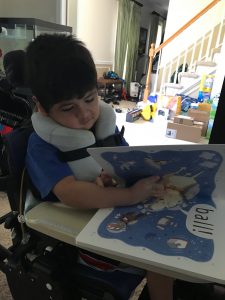 I was gathering my things to leave Joey’s house, when I heard Joey say “under” from the eye gaze device. He’d been playing with a toy bee on his tray and he’d lost it. As I chatted with his mom, he said “bee, grasshopper, fly” and pointed in the direction of the floor. But I was busy with my conversation, and didn’t really notice what was going on. And so, he reached deeper into his repertoire. UNDER. He told me where I could find the item. Independently. Without prompting.
I was gathering my things to leave Joey’s house, when I heard Joey say “under” from the eye gaze device. He’d been playing with a toy bee on his tray and he’d lost it. As I chatted with his mom, he said “bee, grasshopper, fly” and pointed in the direction of the floor. But I was busy with my conversation, and didn’t really notice what was going on. And so, he reached deeper into his repertoire. UNDER. He told me where I could find the item. Independently. Without prompting.
Like so many times with Joey, one small word is so meaningful.
Usually, when Joey drops items, he points to them. I use the strategy of “playful obstruction”, (also known as playing dumb), and I pretend to be confused about what he wants. This means he has to use his device to tell me specifically what he wants – the toy car, dragon, or bug – whatever he’s been playing with. Sometimes, we work on using the whole sentence “I want….” or “Please give me….” Other times, I pretend I can’t find the item he’s asked for.
“But where is it?” I’ll scratch my head, and pretend to look on top of the cabinet. “Where is that car you want?” I prompt Joey to his preposition page, and he selects a word that indicates it’s on the floor. No matter what he says, I’ll look there. Last winter this meant crawling behind his wheelchair and then telling him it wasn’t behind him, and asking him to try again. Eventually we always find it. (I do all of this while reading his frustration level. We play these games when I know he can hang in there with me on using this vocabulary. I don’t do it to the point of crying or frustration – hence the “playful” part of “playful obstruction”.)
Despite this practice, Joey rarely uses prepositions unless I prompt him to. He’ll label where things are in a book or his room, but it’s almost always after I gesture to the preposition bridge icon on his device. So to hear him independently tell me “bee under” made my heart soar.
Prepositions are tricky, because they are not as meaningful to young children as tangible nouns or physical verbs are. And yet, I once read an article on an AAC facebook group about how someone is far more likely to be able to communicate what they need if they can use prepositions. Even if a child does not have the noun he/she wants on the device, the child can use prepositions to direct the adult in the room to find the item. Prepositions are important when we communicate with each other.
Joey’s “bee under” as I was leaving was a sign to me that he understands prepositions, and understands how to use them to communicate about where things are in space. As I’ve crawled around on his floor, playing dumb until he tells me where to find his lost toy, this moment is what I’ve been waiting for.


